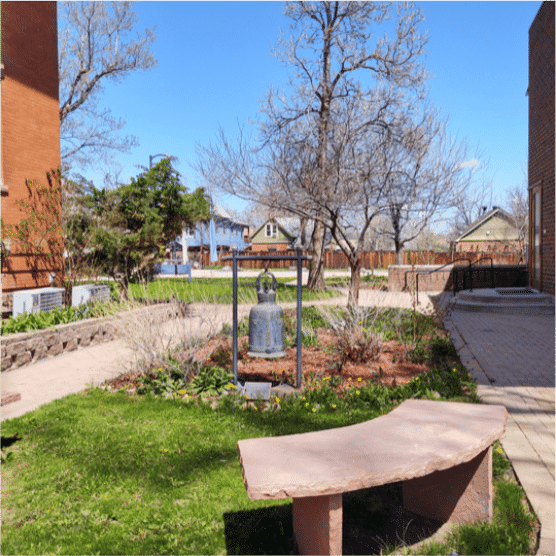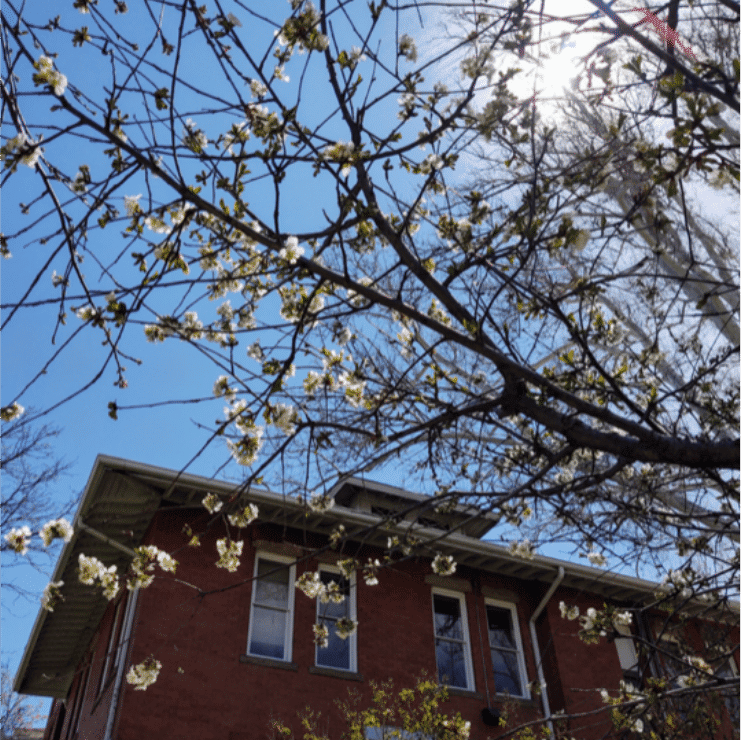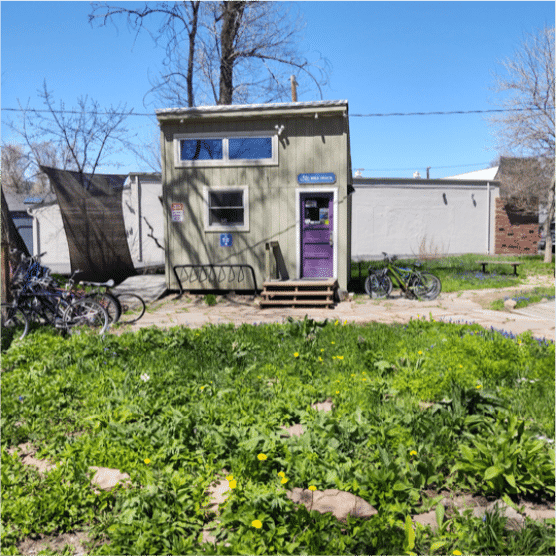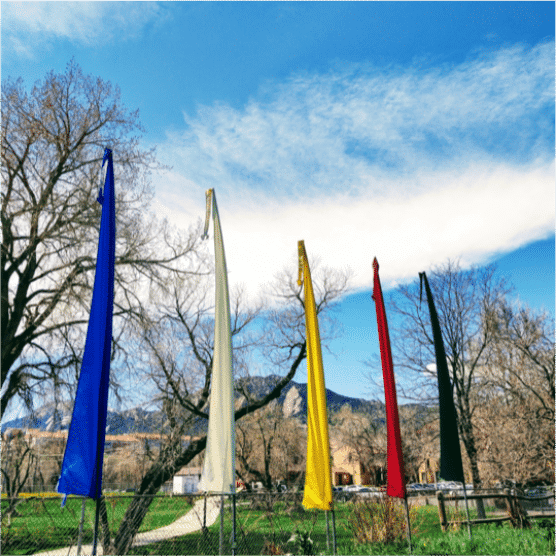Sustainability
Committing to the Practice of Sustainability
At Naropa, we view the practice of sustainability as essential to the current and future needs of this planet and its inhabitants through the acknowledgement of the deep interrelationship between all beings and phenomena.
The health of our environment is seen as directly related to, and reflective of, the community’s psychological state and the genuineness of effectiveness of the University’s educational mission. Naropa University aspires to be a leader in the practice of sustainability that promotes the individual and collective integration of ecological, economic, and spiritual well-being.
Naropa University is committed to sustainability-in-action; employing strategic initiatives to move the community towards specific goals, such as, but not limited to, zero waste, climate neutrality, and 100% renewable energy. This practice of sustainability in everyday life educates and prepares each member of the Naropa University community to live and act with awareness and respect for oneself, all other sentient beings, and the natural world.
"How do you practice sustainability?": Students Respond

Naropa President Signs Declaration of Climate Emergency, February 2020
As institutions and networks of higher and further education from across the world, we collectively declare a Climate Emergency in recognition of the need for a drastic societal shift to combat the growing threat of climate change.
The young minds that are shaped by our institutions must be equipped with the knowledge, skills and capability to respond to the ever-growing challenges of climate change. We all need to work together to nurture a habitable planet for future generations and to play our part in building a greener and cleaner future for all.
We are today committing to collectively step up to the challenge by supporting a three-point plan which includes: 1. Mobilizing more resources for action-oriented climate change research and skills creation; 2. Committing to going carbon neutral by 2030 or 2050 at the very latest; 3. Increasing the delivery of environmental and sustainability education across curriculum, campus and community outreach programmes.
We call on governments and other education institutions to join us in declaring a Climate Emergency and back this up with actions that will help create a better future for both people and our planet.
Sustainability Projects on Campus
Nalanda Building Performance
Being over 50,000 square feet, the Nalanda Campus building is subject to the “Boulder Building Performance Ordinance” which requires that we perform things such as annual energy reporting to the city and an Ashrae Level II Energy Audit. From the City of Boulder’s website:
Energy Efficiency for Commercial and Industrial Buildings
In support of community energy and climate goals, the Boulder City Council adopted the Boulder Building Performance Ordinance (Ordinance No. 8071) on Oct. 20, 2015. These rating and reporting and energy efficiency requirements move beyond current voluntary programs to require actions that reduce energy use and improve the quality of Boulder’s commercial and industrial building stock.
Ordinance Requirements
This ordinance requires privately-owned commercial and industrial buildings and city-owned buildings to do the following:
- Annually rate and report building energy use;
- Perform energy assessments every ten years;
- Perform retrocommissioning every ten years and implement cost effective retrocommissioning measures within two years of the study; and
- Implement one-time lighting upgrades.
Changes to ACUPCC
In 2015 the American Colleges and University Presidents’ Climate Commitment (ACUPCC) was re-branded as the “Carbon Commitment” by its organizing body Second Nature. As part of the changes, Second Nature also added two additional commitments. Naropa is looking to increase its commitment level by signing the “Climate Commitment” which includes a resilience aspect, sometime in 2017.
Updates to the STARS Report
The sustainability staff is working on updating Naropa’s Sustainability Tracking and Rating System report, also know as STARS. As the report stands currently, Naropa has a silver rating. However, we are hoping that will further investigation and with the changes that have occurred over the 2015/2016 school year that we can get a gold rating.
Updates to the Climate Action Plan
Naropa’s Climate Action Plan was last updated in 2013. The goal is to update the Climate Action Plan this year to reflect progress on sustainability measures since 2013, as well as the addition of new goals and commitments since. Some important things that will be added to the next update to the Climate Action Plan include measures such as:
- The 2016 greenhouse gas inventory results
- The addition of the Climate Commitment goals
- Solar energy systems on the Print Shop and Pavilion
- Paramita upgrades and Level II Energy Audit at Nalanda
- Alternative transportation options such as Boulder BCycle and eGo carshare
- Management of the campus cafes by Boulder Bridge House
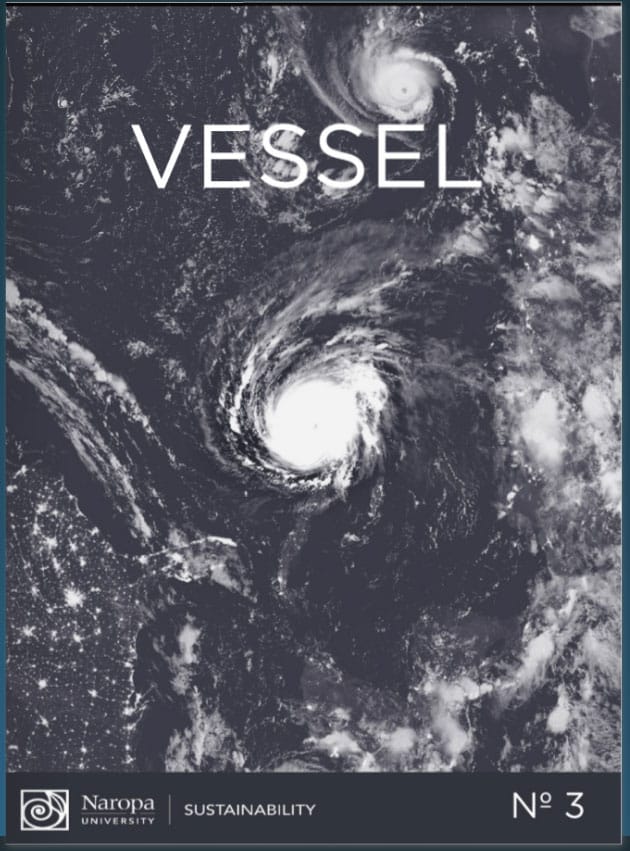
Sustainability Areas of Concentration
Naropa University is committed to developing sustainability not only in terms of a greener campus, but also in our teaching and learning. Our vision is to define sustainability in a contemplative context, including both its inner and outer aspects.
Naropa ratified its Climate Action Plan first in 2011 and updated it again in 2013. Naropa is looking to expand its commitments to sustainability by signing the “Climate Commitment” which includes a resilience aspect. Naropa University has two solar photovoltaic (PV) power systems. In the fall of 2013, Naropa made history by becoming the first university to completely divest its holdings in companies identified as having the highest potential greenhouse gas emissions.
For more than twenty years, Naropa University landscapers have used environmentally sound practices, creating a campus that is a model of sustainability and regenerative land management. This includes edible landscaping, food forest, and community greenhouse.
The Naropa Sustainability Council (NSC) is an open and inclusive gathering for all members of Naropa University. This is a space that gives life to ideas and initiatives toward sustainable and regenerative living. NSC is focused on increasing ecological literacy and reducing our carbon footprint. NSC acts as a liaison for the student body to make an impact on the university as a whole.
Naropa University’s Zero Waste goal is to mindfully support the university in being a sustainable system where resources are fully used and waste is reduced to a minimum. Naropa currently boasts an 80% diversion rate, thanks in large part to the campus-wide recycling and compost bins located in all common areas of all buildings and exterior space.
